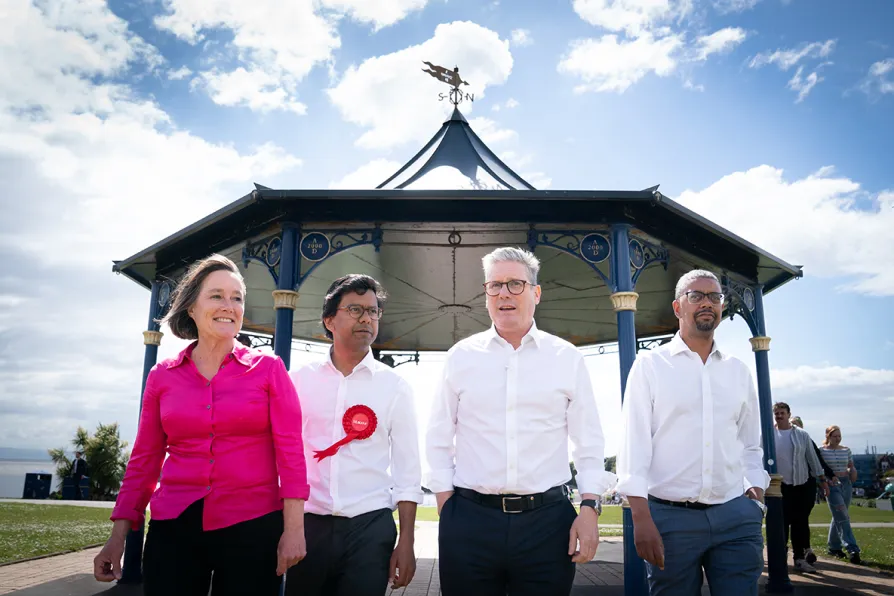
 Labour Party leader Sir Keir Starmer (centre right) Vale of Glamorgan candidate Kanisha Narayan (centre left), First Minister of Wales Vaughan Gething (far right) and shadow Welsh secretary Jo Stevens (far left) on the General Election campaign trail in Wales, May 30, 2024
Labour Party leader Sir Keir Starmer (centre right) Vale of Glamorgan candidate Kanisha Narayan (centre left), First Minister of Wales Vaughan Gething (far right) and shadow Welsh secretary Jo Stevens (far left) on the General Election campaign trail in Wales, May 30, 2024
SO FAR, people power has been absent from the general election. Labour’s leaders operate, indeed, as if mobilising their own base is irrelevant.
Despite the promises that followed falling votes in Muslim areas in the local elections, the aggressive factionalism of the hard-right clique around Keir Starmer has intensified, reflected in a sudden purge of left-wing candidates and the imposition of right-wing ones without even token reference to local wishes.
Parachuting Oxford resident Luke Akehurst into the North Durham seat would be insulting on its own: given his pro-Israel tub-thumping is extreme even by the Labour right’s standards — few Labour Friends of Israel get photographed wearing “I’m a zionist shitlord” T-shirts, or take to social media to explicitly defend Israeli attacks on hospitals — it looks recklessly provocative, a middle finger to activists anguished by the horrific war on Gaza.
This disdain for the footsoldiers reflects the Blairite approach to elections: people are defined as consumers, offered policy shop-fronts by the Establishment parties and expected to pick from the selection on display. We can choose Labour’s tax-and-spend plans or the Tory tax-and-spend plans, Labour’s foreign policy or the Tory foreign policy, Labour’s vision for the NHS or the Tory one — and if those products are as similar as Coke and Pepsi, it shows democracy is being managed just right.
Yet the policies on offer reflect neither the gravity of the crisis Britain faces nor even public opinion as it stands. If we want a choice on our future, issues will have to be forced into the debate from below.
The most pressing is Palestine.
Palestine is urgent: the killing continues every day, and is facilitated by the continued flow of arms and other supplies by Israel’s allies, including Britain. The war has to be stopped.
Palestine is also the democratic front line of British politics. The mass movement for peace is the largest in decades. The Establishment response has been a full-frontal attack on democratic rights: smears that the protest movement is anti-semitic or has threatened MPs, proposals to ban protest outside Parliament, MPs’ offices and councils, a new definition of extremism allowing ministers to blacklist organisations on the vaguest grounds. If these measures are allowed to stand, they will have a chilling effect on democracy long-term: politicians must be made to feel the depth of public anger and learn to fear it, as the selection of headbangers like Akehurst suggests they still don’t.
And Palestine reflects the gulf in Britain between rulers and ruled: a large majority of the public want a ceasefire and an arms embargo, but Parliament in its majority stands in the way.
That democratic deficit must be exposed — and it applies to a whole range of other areas, where campaigning for popular demands rather than politicians’ prospectuses is essential.
The ongoing rows over Thames Water mean the ownership and control of water is a hot topic: why are the big parties allowed to ignore it? The takeover of Royal Mail by a Czech billionaire should focus minds on the destruction of a public service by a decade of private ownership: why isn’t reversing that on the table as we head to the polls?
Labour is not so mighty it can afford to ignore popular pressure entirely. A Tory campaign focused on extremist gimmicks like bringing back conscription could win back Reform voters; Labour’s performance in locals and by-elections suggest it has not gained voters by nearly as much as the Tories have lost them; and it has begun its election campaign with a series of egregious insults to the activists it will rely on to go door to door persuading people to vote.
A “get what we’re given” defeatism should not debilitate the labour movement in this election. We have demands: let’s make them heard.

In the run-up to the Communist Party congress in November ROB GRIFFITHS outlines a few ideas regarding its participation in the elections of May 2026

The New York mayoral candidate has electrified the US public with policies of social justice and his refusal to be cowed. We can follow his example here, writes CLAUDIA WEBBE












